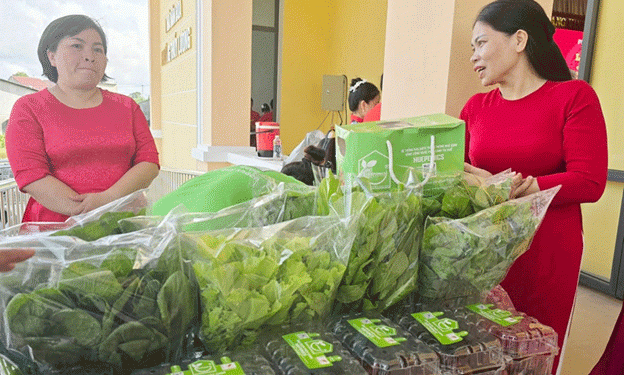For generations, the people of Tuy Luong have been dedicated to traditional agriculture, focusing primarily on rice and vegetable cultivation. However, rising consumer demand for safe, high-quality food has inspired local authorities to encourage farmers to adopt innovative farming methods, like VietGAP-certified safe and organic practices. Among these modern pioneers is Mr. Ngo Xuan Phuoc, director of the Hue Hydroponic Agriculture Cooperative in Group 3, Tuy Luong district.
In early 2023, Mr. Phuoc invested over 2 billion VND to transform a 1,000-square-meter plot into a hydroponic vegetable farm, installing net houses, greenhouse covers, and advanced hydroponic equipment. His crops include high-value vegetables such as mustard greens, lettuce, spinach, tomatoes, and melons. The high-tech hydroponic model is not only environmentally friendly but also highly productive, allowing farmers to grow crops more rapidly than in traditional farming.
Efficient, Organic, and High-Yield Production
One of the primary advantages of hydroponic farming is that it requires no soil, pesticides, or synthetic fertilizers. In Mr. Phuoc’s farm, plants receive nutrients directly through a water-based solution, ensuring an efficient and consistent growth rate while eliminating chemical residues. This eco-friendly approach results in safe, organic produce that aligns with current consumer preferences and health standards.
Additionally, hydroponic systems maximize land use, enabling farmers to cultivate a variety of crops even in compact spaces. In just over a year, Mr. Phuoc’s model has proven its potential: his farm now yields an average of 30-40 kg of vegetables and fruits daily. With produce priced at 30,000-40,000 VND per kilogram, Mr. Phuoc’s revenue reaches 1-1.5 million VND per day—a significant income boost for his cooperative.
Challenges of High-Tech Hydroponic Farming
Despite the advantages, transitioning to hydroponics in Tuy Luong is not without challenges. Initial capital costs for high-tech farming are high, with Mr. Phuoc’s investment exceeding 3 billion VND. Additionally, local weather patterns—marked by unpredictable rains, floods, and heat waves—can disrupt hydroponic systems, affecting crop quality and yield.
Skill requirements also pose a barrier: managing a hydroponic system demands specific technical knowledge, yet many workers in Tuy Luong are accustomed to traditional farming and lack formal training. This knowledge gap hinders the widespread adoption of advanced farming techniques and underscores the need for more robust educational support for local workers.
Market Access and Consumer Awareness
While hydroponic products from Tuy Luong have been available for several years, they remain relatively new to many consumers, posing marketing challenges. As hydroponic, organic, and safe produce gains popularity, local cooperatives face the task of educating the public and expanding consumer demand. To support these efforts, the Tuy Luong district government is working to enhance market access for hydroponic produce, assisting cooperatives in branding and linking with businesses interested in purchasing hydroponic vegetables and fruits.
Local Government Support for Sustainable Agriculture
The Tuy Luong People’s Committee, led by Mr. Nguyen Minh Cong, recognizes the area’s agricultural potential, especially in vegetables, tubers, and fruits. The local government is promoting the shift toward safe, organic farming, providing favorable policies and access to low-interest loans to support high-tech agricultural initiatives. With nearly 13 hectares of vegetables now cultivated, the district envisions a future where hydroponic and organic production can meet modern food safety standards while offering economic benefits to local farmers.
Hydroponic farming in Tuy Luong represents a transformative approach to agriculture, balancing high yield with sustainability. By adopting high-tech hydroponic methods, Tuy Luong farmers like Mr. Phuoc are meeting consumer demands for safe, organic food while increasing their income potential. Although challenges remain—such as initial costs, skill gaps, and consumer awareness—the support of local authorities and cooperatives is paving the way for a more resilient and innovative agricultural future in the region.












